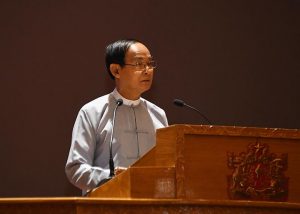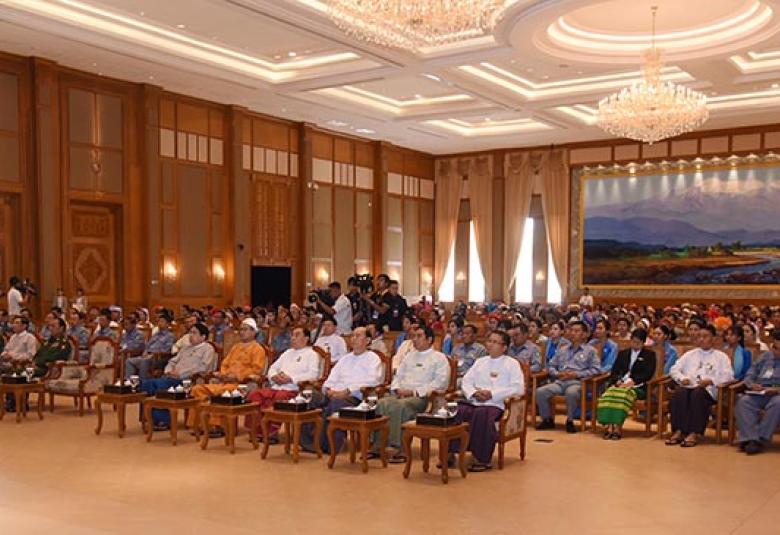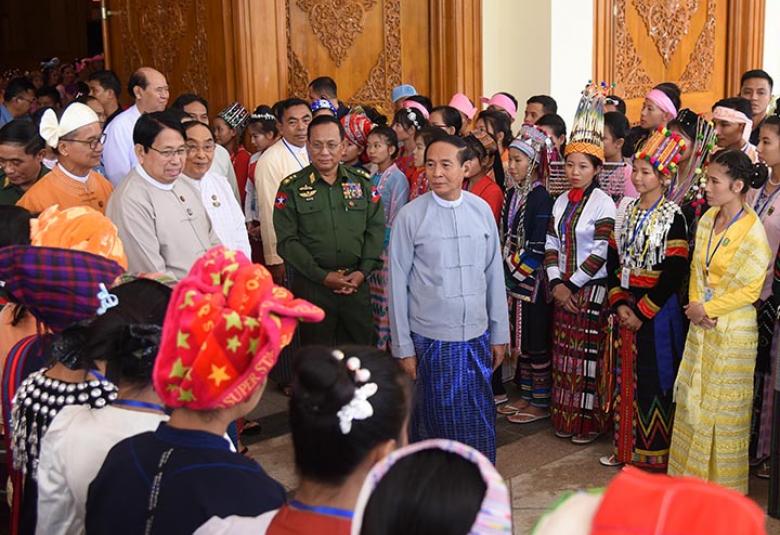3 October
President U Win Myint received graduates from the University for the Development of the National Races of the Union yesterday morning at the Presidential Palace in Nay Pyi Taw.
The students were the third batch to successfully complete the five-year education degree course. They paid their respects to the President and sought advice from him.
The event was attended by Union Ministers Lt-Gen Ye Aung, Dr Pe Myint, U Min Thu, U Ohn Maung, Nai Thet Lwin; Deputy Ministers Maj-Gen Than Htut and U Win Maw Tun; departmental heads, the Rector, the Deputy Rector and teachers of UDNRU and officials.
The President first extended greetings to those at the ceremony and expressed appreciation in meeting with the students as he said the students have recently completed the five-year education degree programme and have become potential architects who would build up the future of education for the country and its people. The President added that Myanmar comprised over 100 ethnic races who have lived together in unity for many years, sharing weal and woe. The divide and rule policy of colonialists left doubts, mistrusts and disagreements among the people from upper and lower Myanmar. This policy was one the underlying reasons for the prevailing internal armed conflicts in Myanmar, hindering the nation-building process of the country.
Seeing this root cause, successive state leaders have tried to work for infrastructure development, human resources development and poverty reduction programmes.
One part of these efforts included the establishment of the Institute for Development of the National Races of the Union on 20 October 1964. It was promoted to a university on 10 March 1991 to offer higher level education for the ethnic people from border areas.
President U Win Myint also emphasized the importance of human resources for national development, and that the Education and Training Department under the Ministry of Border Affairs has offered a free education system of basic and higher levels for the ethnic people in border areas by setting up 45 youth training schools across the country, as well as the University for the Development of the National Races of the Union and the colleges of Nationalities Youth Resource Development Degree in Yangon and Sagaing regions.
He said education was the most fundamental requirement for human resources development, and that it developed the mental, ethical and physical development of the young people. Education was key to the prosperity of individuals and the whole country. And that the state established the UDNRU to generate capable teachers who would then share their knowledge at the basic education schools in remote areas after studying for five years theoretically and practically.
The President also expressed that the government was trying to develop the country into a Democratic Federal Union enjoying sustainable development in the world. In this regard, the Myanmar Sustainable Development Plan (2018-2030) has been adopted. The Goal 4 under this plan had focused on human resources and social development for a 21st century society, and it has set a strategy to improve equitable access to high quality lifelong educational opportunities. It was the aspiration of every citizen with regard to education.
As Myanmar was implementing the National Education Strategic Plan (2016-2021), the teacher candidates need to have possessed 21st century skills and soft skills of personality.
The President also suggested them to train the students for the skills in collaboration, communication, critical thinking and problem solving, creativity and innovation and citizenship which were required to overcome various challenges in the world. He also advised to match these skills with honesty.
He also asked them to produce the students who can accept the concept of equality and diversity, respect democratic practices and human rights norms, and promote varieties of ethnic languages, literatures, cultures, arts and customs of ethnic people in 21 century knowledge era.
The President also said the capacity of teachers was pivotal to education reform to meet international norms, and that they were urged to continue life-long learning to develop professional skills and to share their knowledge again as only those who were seeking knowledge continuously could survive in the changing trend of globalization to be able to enjoy future opportunities.
He remarked that the fast-developing world had delivered both challenges and opportunities, and that it was important for all to build up their capacity for better chances. He also advised them to promote human resources of ethnic youths in accordance with the policies of the Ministry of Education on no discrimination at all levels of education, no one outside education and no dropout from schools.
The President firmly reminded the avoidance of narcotic drugs in various forms for the young people as the illegal drugs would pose dangers on the young people.
According to the 2018 statistics of the Ministry of Health and Sports, there were around 93,000 injection drug users in Myanmar, with an increase in the drugs related communicable disease such as HIV, Hepatitis C and Tuberculosis. The President urged them to work for ensuring illegal drug-free schools as the government was eradicating narcotic drugs as a national task. He also called for developing union spirit that could protect sovereignty of the State and cultural heritage of the ethic people who were living in the country with abundant natural resources.
The President also remarked that healthy lives and high level of education were the major resources for the future of the country and that these factors were the indicators to measure the development of a country. Lower living standards and lack of health knowledge were the underlying reasons for diseases, and that school healthcare services could help to disseminate this knowledge. He also advised to develop the physical and mental well-being of the young people.
Regarding the principles of civil service staff, the President said the civil employees play a pivotal role in administrative pillar together with the other two pillars of legislation and judiciary of a country. He also remarked that capable and self-confident civil service employees were the main backbone for democratic practices due to their good ethics, free of bias, responsibility and accountability. These attitudes cold make mutual trust between the public sector and the people as the performance of civil service staff represented the image and the value of the State.
The President also asked them to try their best for the socioeconomic development of ethnic people and to spread union spirit among national brethren, while he highlighted peace and stability for the development of the country by promoting education to ensure lasting prosperity resulted from the knowledge and education.
He then called for the collective strength of all national people with their powers in strong belief, unity and knowledge in building a powerful country in the world.
The President also urged to reapply the knowledge received from this excursion tour in their respective areas, and finally advised to generate ethical citizens, to train for 21st century skills and soft skills in personality, to persuade the local people for conserving national prestige and for cherishing the country, to take part in local development programmes, to respect languages, literatures, cultures and customs of ethnic people for thriving union spirit and to help the government in the efforts of peace, stability and rule of law.
After the President’s speech, Poe Kayin student Ma Nan Yin Yin Htwe from Kawkareik township of Kayin State expressed words of thanks.
Then, the students presented a commemorative gift as a reminder of their excursion tour to the President.
Next, the President and Union Ministers posed for documentary photos with the students and attendees at the event.
After the ceremony, the President cordially greeted the students.
MNA
(Translated by Aung Khin)




